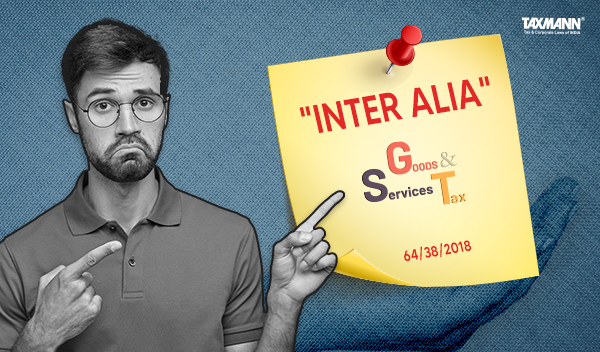[Opinion] Importance of the Phrase “Inter Alia” Used in Circular and Its Impact on Penalty Under Section 129 of the CGST Act 2017
- Blog|News|GST & Customs|
- 2 Min Read
- By Taxmann
- |
- Last Updated on 9 May, 2024

CA Rajesh Kumar Khandelwal – [2024] 162 taxmann.com 255 (Article)
Section 68 of CGST Act 2017
According to Section 68 of the CGST Act, along with Rule 138A of the Central Goods and Services Tax Rules, 2017 (referred to as ‘the CGST Rules’), the person in charge of a conveyance carrying goods valued at more than Rs 50,000/- must carry specific documents. These documents include the invoice, bill of supply, delivery challan, bill of entry, and a valid e-way bill in either physical or electronic form for verification.
Failure to carry these documents constitutes a violation of the law, and the provisions of Section 129 and Section 130 of the CGST Act can be invoked. Additionally, it’s important to note that not providing information in Part B of FORM GST EWB-01 renders the e-way bill invalid for road transportation, except when goods are transported within a distance of up to fifty kilometers within the same state or union territory between the transporter’s place of business and the consignor’s or consignee’s place of business.
Section 129 of CGST Act 2017
Section 129 of the CGST Act provides for the detention and seizure of goods and conveyances. These can be released upon payment of the requisite penalty in cases where the goods are transported in violation of the provisions of the CGST Act or the rules made thereunder. However, it has come to notice that proceedings under section 129 are being initiated even for minor, clerical, or technical mistakes mentioned in the documents, as per rule 138A.
Circular No. 64/38/2018-GST New Delhi, dated the 14th September 2018
In light of the stringent penalty provisions under section 129 of the CGST Act 2017, several representations were submitted to the Central Board of Indirect Taxes and Customs (CBIC) regarding the imposition of penalties for minor discrepancies in the details mentioned in e-way bills. Despite no major lapses in the invoices accompanying the goods during movement, penalties were being levied. After careful examination, the CBIC, exercising its powers conferred under section 168 of the Central Goods and Services Tax Act, 2017 (referred to as ‘the CGST Act’), issued Circular No. 64/38/2018-GST on September 14, 2018. This circular addresses technical and clerical mistakes related to e-way bills.
Click Here To Read The Full Article
Disclaimer: The content/information published on the website is only for general information of the user and shall not be construed as legal advice. While the Taxmann has exercised reasonable efforts to ensure the veracity of information/content published, Taxmann shall be under no liability in any manner whatsoever for incorrect information, if any.

Taxmann Publications has a dedicated in-house Research & Editorial Team. This team consists of a team of Chartered Accountants, Company Secretaries, and Lawyers. This team works under the guidance and supervision of editor-in-chief Mr Rakesh Bhargava.
The Research and Editorial Team is responsible for developing reliable and accurate content for the readers. The team follows the six-sigma approach to achieve the benchmark of zero error in its publications and research platforms. The team ensures that the following publication guidelines are thoroughly followed while developing the content:
- The statutory material is obtained only from the authorized and reliable sources
- All the latest developments in the judicial and legislative fields are covered
- Prepare the analytical write-ups on current, controversial, and important issues to help the readers to understand the concept and its implications
- Every content published by Taxmann is complete, accurate and lucid
- All evidence-based statements are supported with proper reference to Section, Circular No., Notification No. or citations
- The golden rules of grammar, style and consistency are thoroughly followed
- Font and size that’s easy to read and remain consistent across all imprint and digital publications are applied



 CA | CS | CMA
CA | CS | CMA
